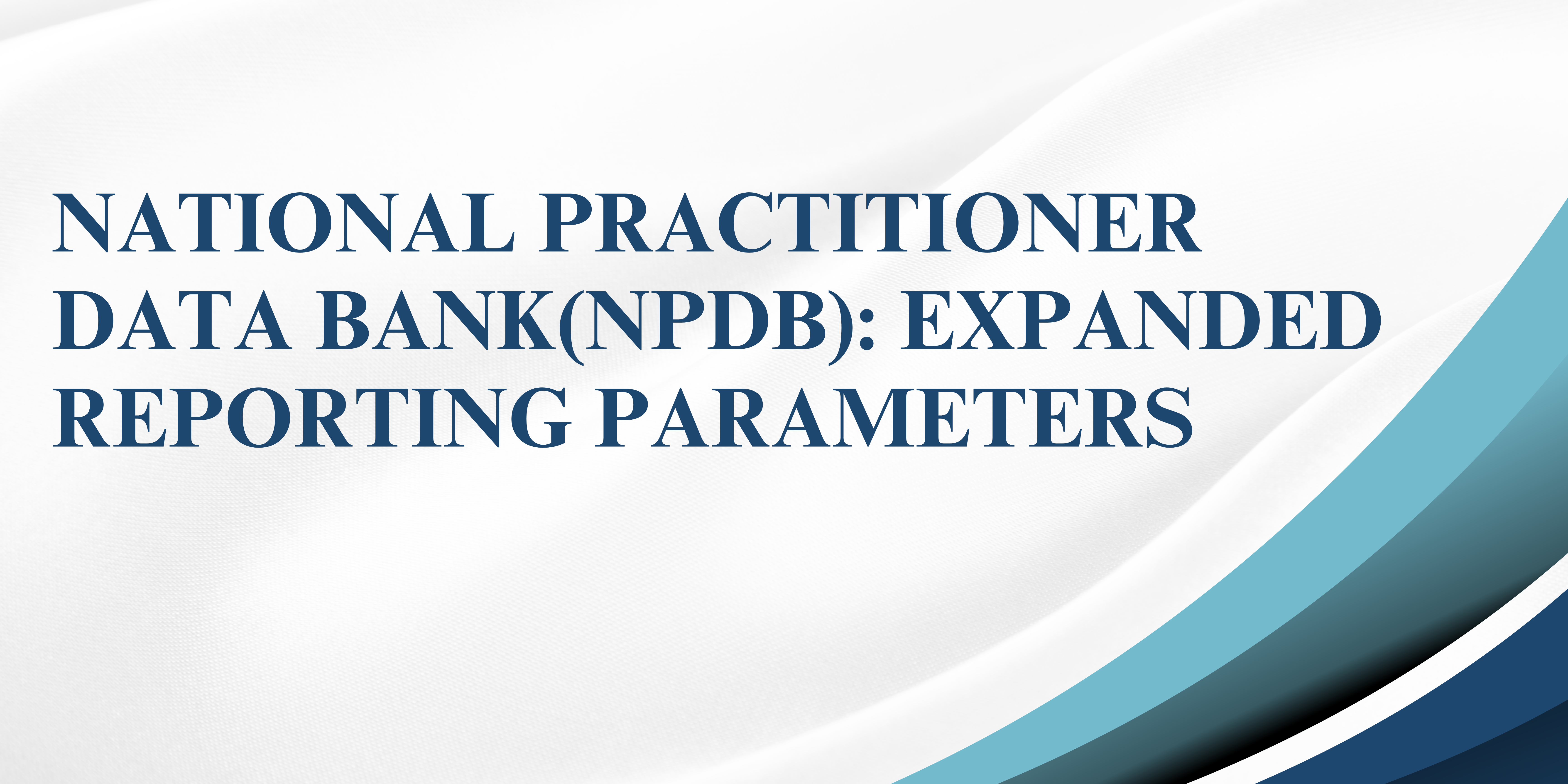
NATIONAL PRACTITIONER DATA BANK(NPDB): EXPANDED REPORTING PARAMETERS
The Health Care Quality Improvement Act (HCQIA) of 1986 created the National Practitioner Data Bank (NPDB), which collects essential information about healthcare providers, such as disciplinary actions and malpractice claims. Congress established HCQIA to address the rise in medical malpractice cases and to improve the quality of medical care across the United States beyond what individual states could manage alone.
To encourage fair evaluation of medical professionals, the law protects hospitals and other healthcare organisations, as well as individuals involved in professional reviews, from being sued for damages as long as they act in good faith. Anyone who fails to report required information about malpractice payments can be fined up to $25,000, and those who breach NPDB confidentiality can be fined up to $11,000.
Medical Malpractice Payments:
Hospitals, self-insured entities, and other healthcare providers must report any medical malpractice payments made on behalf of a healthcare practitioner due to a claim or judgment. These reports must be submitted to the National Practitioner Data Bank (NPDB) and the relevant State Licensing Board within 30 days.
Adverse Licensure Actions:
State Medical and Dental Boards need to report any negative licensure actions related to professional competence or conduct. If they comply with Section 1921 requirements, they also meet Title IV reporting requirements. Reports must be submitted to the NPDB within 30 days of the action.
Professional Review Actions:
Hospitals and healthcare entities with formal peer review processes must report any professional review actions that negatively impact clinical privileges for more than 30 days. This includes voluntary surrender or restriction of privileges to avoid investigation. Reports are due to the National Practitioner Data Bank and the appropriate State Licensing Board within 30 days.
DEA Actions:
The Drug Enforcement Administration (DEA) must report any controlled substance registration actions to the NPDB within 30 days.
HHS Exclusions. The Department of Health and Human Services (HHS) Office of Inspector General must report exclusions from federal healthcare programs, such as Medicare and Medicaid, to the NPDB monthly.
Section 1921
- Peer Review Organizations: Must report negative findings to the NPDB and State Licensing or Certification Authorities within 30 days.
- Private Accreditation Organizations: Must report adverse findings similarly within 30 days.
State Licensing and Certification Authorities
- Actions taken through formal proceedings, like revocation, suspension, reprimand, censure, or probation.
- Dismissal or closure of proceedings if a license or certification is surrendered or if the practitioner leaves the state or jurisdiction.
- Any other loss of, or the right to apply for or renew, a license or certification.
- Any publicly available adverse action or finding.
State Enforcement Agencies and Medicaid Fraud Control Units
Must report exclusions from state healthcare programs, healthcare-related civil judgments, state criminal convictions, and other adjudicated actions within 30 days.
Section 1128E:
- Federal licensure and certification actions, such as revocation, suspension, reprimand, censure, or probation.
- Dismissal or closure of proceedings if the license or certification is surrendered or if the practitioner leaves the state or jurisdiction.
- Any other loss of, or the right to apply for or renew, a license or certification.
- Any publicly available adverse action or finding.
- Healthcare-related civil judgments in Federal or state court.
- Healthcare-related criminal convictions in Federal or state court.
- Exclusions from participation in a Federal health care program.
- Other adjudicated actions or decisions related to the payment, provision, or delivery of a health care item or service.
Sanctions for Non-Reporting
Entities that fail to report required information face significant penalties, including civil fines and loss of legal protections and immunities.
- Malpractice payers may incur fines of up to $23,331 per unreported payment.
- Healthcare entities that do not report adverse actions can lose liability immunity and face publication in the Federal Register.
- State Medical or Dental Boards may have their reporting responsibilities revoked.
- Professional societies and health plans can lose immunity protections and face fines of up to $39,811 per unreported action.
Hospitals must check the NPDB when a doctor applies for staff privileges and every two years for all doctors on staff. They must also report any disciplinary actions that affect a doctor's clinical privileges for more than 30 days, including voluntary actions taken to avoid investigation.





Comprehensively explained the details of HCQIA's regulations and reporting requirements, ensuring accountability and improved healthcare quality in the U.S.